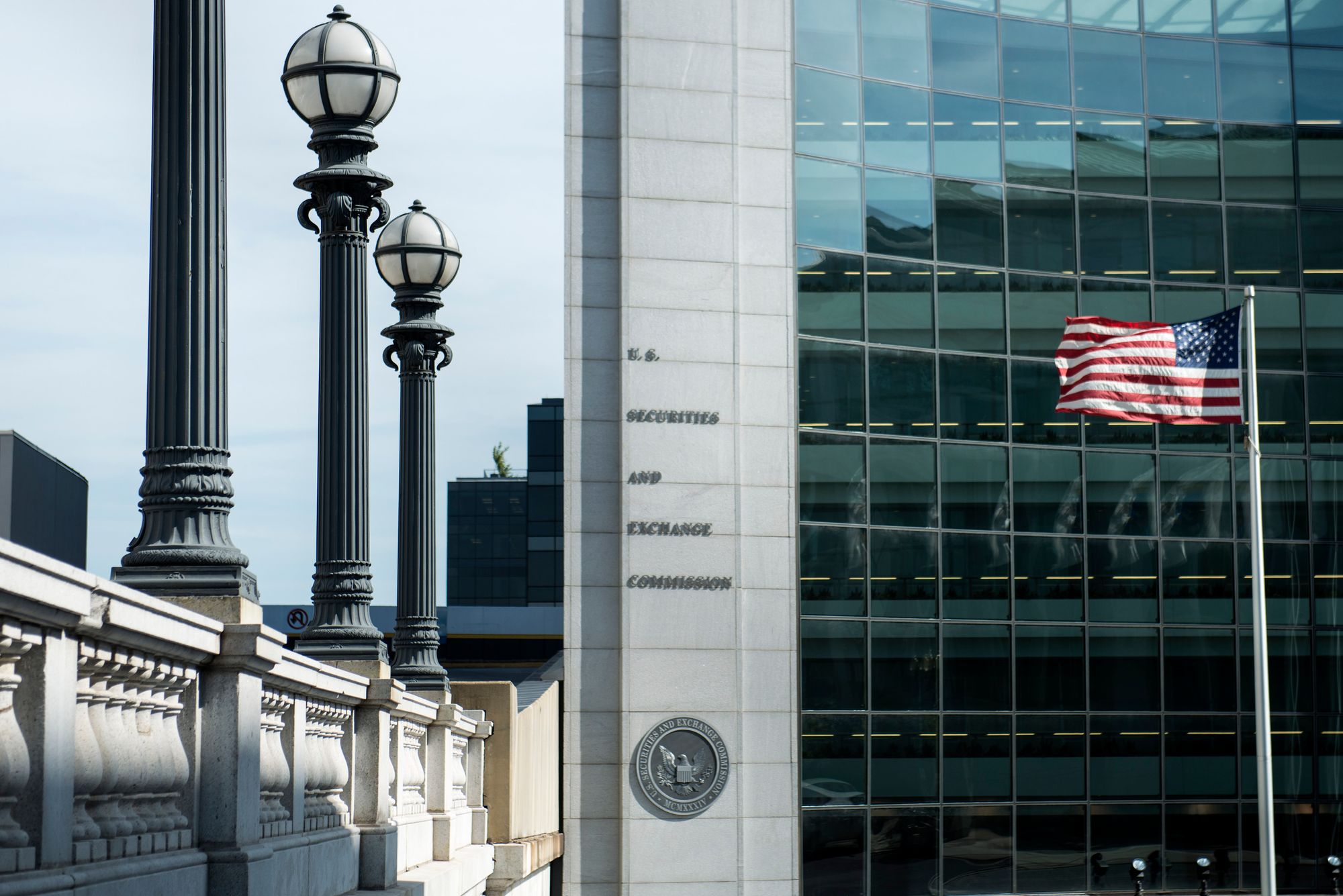You can always find some way to have the past justify what you want to do now

Your continued support as a paid subscriber is greatly appreciated.
Earlier this week the sickos on the 5th Circuit Court of Appeals ruled on a case called Jarkesy v. SEC finding that the Securities and Exchange Commission violated a hedge fund's constitutional rights by trying them and punishing them for wrongdoing using in-house agency judges instead of a jury trial. Sounds boring but turns out it could be the beginning of the end of the regulatory power of the administrative state as we know it with implications for other agencies like the CDC and the FDA and the EPA! If you're a rich guy who owns a meat packing business and you pollute into a river and you sell spoiled meat and you’re doing financial fraud on the side you're pretty happy right now.
The 5th Circuit just dismantled the SEC's power to enforce securities law. This decision is beyond radical. It is nihilistic. https://t.co/6X46t2f4vY
— Mark Joseph Stern (@mjs_DC) May 18, 2022
Being too stupid to understand what happened I called up Hell World Legal Analyst Charles Star to talk me through it. Star is a Brooklyn-based lawyer who podcasts at Hostile Witness (which is coming out of hibernation) and ALAB Series (eventually coming again). Follow him on Twitter for updates about when those new episodes drop.
Star previously wrote for Hell World about the case of a man in Texas who was threatening to set himself on fire so the cops tased him thereby instantly setting him on fire and were granted qualified immunity for doing so. We also spoke previously about some egregious abuses of qualified immunity here and here.

Read me and Star below. Hold on though.
Here's some good news:
The House passed the prison moratorium today! This stops the proposed new women's prison. We need to invest in mental health supports, substance use treatment & housing, not jails. TY @justicehealing @BlackAndPinkMA @RepChynahTyler @Jo_Comerford #NoNewWomensPrison pic.twitter.com/ZEnLedoAde
— Christine Barber (@Barber4StateRep) May 19, 2022
You'll recall previous reporting on this movement against new women's prisons in Hell World by Andrew Quemere and Bill Shaner.


Look at this fucking shit. I can't believe they would do this. Only charge $40.
My little sister has been really struggling with a health condition lately and finally got to see a doctor. They charged her $40 for crying. pic.twitter.com/fbvOWDzBQM
— Camille Johnson (@OffbeatLook) May 17, 2022
Former President George W. Bush: “The decision of one man to launch a wholly unjustified and brutal invasion of Iraq. I mean of Ukraine.” pic.twitter.com/UMwNMwMnmX
— Sahil Kapur (@sahilkapur) May 19, 2022
There are all manner of different theories about why people laugh when faced with what should otherwise be a terrifying situation. The topic often comes up with respect to horror movies. Why we can sit in a theater cackling when a guy gets his entire asshole chopped off piece by piece by some big lug with a meat grinder. Laughter serves as a similar release of nervous tension as screaming would one idea goes.
Another thing is that laughter is a social signal to others that what we're seeing isn't really as frightening as it might seem so everyone can chill out. Like when we watch a guy totally chunk it down a flight of subway stairs and there's that moment where everyone around inhales and then the guy gets up and goes oww my balls and we all go hahaha.
Why Jackass is funnier than any comedy every written.
Maybe it's like when you cry when you're overcome with happiness some other nerds have said. As like a balancing out of the emotions. You're so full to bursting you have to do something one way or the other to let the ill humours out or you'll go insane from the internal tension.
Or maybe it's like when everyone is telling me I suck and should kill myself and I'm actually sitting in my jacuzzi drinking expensive wine laughing about it. The thing is I'm not even mad. No one gets how mad I am not.
I'd like to think that explains some of what happened with the crowd's reaction to George Bush's speech the other night at Southern Methodist University’s George W. Bush Institute in which he addressed Russia's imperial war of aggression against Ukraine.
“Russian elections are rigged. Political opponents are imprisoned or otherwise eliminated from the electoral process,” he said of Russia. He's not wrong ...but.
“The result is an absence of checks and balances in Russia, and the decision of one man to launch a wholly unjustified and brutal invasion of Iraq...I mean of the Ukraine, heh,” he said.
He said heh just like he used to say it.
It honestly was like getting in a time machine for me watching this. It was like when you hear the first chord of a song you listened to a lot when you were in high school.
It was comforting in a way. The anger I felt. Like the opposite of nostalgia how we usually think of it. Not fond but furious. I remember being mad like this! I was so young when I felt mad like this.
So he does the little laugh we all know from real life and from twenty years of impressions. Heh he goes. And then he goes in a much quieter voice... "Iraq too. Anyway..." and the crowd laughs.
He seems to realize to his very slim credit that he's messed up and he tries to save face and this is the fucked up thing I almost felt bad for him for a second! What the fuck is that about? How time sands the edges off even the biggest villains.
So then he goes..."I'm 75..." to cover his ass and he goes... "uh..." and does like a little head move like he's still the goofy frat boy he always was and the crowd laughs again and harder this time.
It's almost like a Letterman routine. Uhhh... Paul have you seen the uhhh half million people I killed?
Half million people ah hah.
[Tapping the note cards] Half million dead.
Michelle on the couch over there after a long day of teaching kids how to be normal just asked me if I was "getting George Bush's ass" because I kept playing the audio of the speech over and over and typing like a crazy person and that sort of took the wind out of my sails not gonna lie. You doing your little diatribes against war criminals and the imperialist state honey?
Let me turn it over to Jack Mirkinson from Discourse Blog for a second:
George W. Bush is dumb enough to make this sort of slip, but he’s comfortable enough to laugh it off in a decidedly twisted way: “Iraq, too.” And he’s right to be comfortable. Everyone laughed. Everyone moved on, just as they’ve done since the moment Bush left office. Bush accidentally said something which is very obvious to pretty much all sentient life on this planet, and it didn’t matter at all, because it’s never mattered. Bush has paid no price, suffered no hardships, faced no consequences for Iraq. He’s Michelle Obama’s bestie, everyone’s favorite amateur painter, a throwback to a gentler time. Referencing Iraq in this way is just a little whoopsie, nothing more.
Bush has always, on some level, received this sort of indulgence, even when the war in Iraq was at its miserable peak. There is a direct line from his unintentional comedy bit this week to his very intentional, extended riff about missing WMDs that he performed at the White House Correspondents’ Dinner in 2004.
You've all read this one before but feels weird not to bring it up again:

Or this:

“Ali was sitting in the back seat of his father’s SUV with two of his cousins,” Dickinson writes. “Blackwater riddled the car with bullets. Ali’s father was driving. When the shooting stopped they thought they had experienced a miracle that they were safe.”
“One of Ali’s cousins said that Ali had been shot. His father opened the door after seeing blood on the window — and Ali’s brain fell out onto the pavement between his father’s feet.”
I suppose it's possible that the laughter from the crowd at a reference to all those people we killed in Iraq was something like nervous laughing in the face of horror but if you're the type of person who attends a George Bush speech in 2022 in the first place it's kind of hard to assume you believe there was any horror involved at all. Why would you be sitting there listening to this guy talk if you believed he was a war criminal? So I can't say for sure why they laughed. Sometimes the explanation for why people laugh is the simplest one of all. Maybe they just really thought it was funny.

Alright here's me and Charles Star.
this decision is insane. virtually all administrative law - which Congress intentionally delegated to executive agencies for subject matter expertise and to relieve the burden on DOJ and the Courts - is now all unconstitutional in the 5th Circuit because... why not!? https://t.co/QAqmcIcnb8
— Prof. Lemon Gogurt, Podcast State University (@Ugarles) May 18, 2022
My first question is: Is the law fake?
A lot of the law is fake for sure. There is a kind of fancy-wigged formality to the whole thing, but there’s an element of it that seems increasingly impossible to defend. I’ve been tweeting a lot about how I think Constitutional law is Calvinball because it’s very results oriented and you can always find some way to have the past justify what you want to do now one way or another. The case we’re talking about today is Jarkesy vs SEC. In that case a hedge fund that was being sued for fraud did the whole “this whole court is out of order!” thing as its primary defense…
And it worked?
I’m sure there was a real defense. But none of that matters. When it gets to us here at the 5th Circuit they’ve already been found guilty. The SEC claimed that they misrepresented everything that they did when they were running the hedge fund. They lied about how they were investing the clients money, they lied about the value of the portfolio to increase their own fees. They did all those sorts of things just to skim money from the people who invested in Patriot28 LLC.
That sounds like a Facebook page your parents would share.
Exactly. It is a name that screams scam for a certain kind of person. But to the person getting ripped off, it seems like, wow, patriotism!
So after holding the hearing, the SEC found them guilty. They gave them a penalty, and they had to disgorge some of what they ripped off, and they were barred from the industry. You can’t run a fund like this anymore. A standard industry bar.
So they appealed to the 5th Circuit?
Yes. Deciding that the 5th would be better because earlier in the process they tried these arguments in the D.C. Circuit. The way jurisdiction for federal agency appeals works is you can either appeal in the circuit where you are, the office where you’re being prosecuted, or you can appeal any federal agency action in the D.C. Circuit, because it oversees the federal agencies which are all based in Washington. The first time Jarkesy went to the D.C. Circuit, to block the prosecution, D.C. said no to all of these theories. None of this has any basis in law. So Jarkesy and Patriot28 go back to the SEC for an administrative hearing, they’re found guilty, and this time they appeal the liability finding to the 5th Circuit.
Of course the 5th Circuit is insane. They said you’re right. It is definitely unconstitutional to be prosecuted in this way in an agency action. They had like four different dubious arguments for why. The dissent was better on all of the issues, I think.
Essentially what did the 5th Circuit say? The SEC is unconstitutional because it deprives individuals of their right to a trial by jury?
That was the big one. They said if you are going to give fines this big and consequences this big, then you are subject to the 7th amendment right to a jury trial under common law. The technical distinction that allows federal agencies, typically, to do prosecutions like this, is you ask whether the right the SEC is trying to vindicate is a public right or a private right. Usually what they mean by a public right is they are enforcing a federal statute.
What the court here said is, well, you’re prosecuting under a fraud theory, and fraud is common law. So this is not a public right it’s a private right. What the dissent argued, and what anyone looking at this ordinarily would say, is there is a huge statutory scheme about what securities fraud specifically is. And it’s not the same as common law fraud, even though it borrows a lot from it because common law fraud has been around longer. But it’s different. And courts have always held that a statute, even if it is similar to a common law doctrine, is a public right, not a private one. And the 5th Circuit just ignored that. They’re like, well, you say that it’s public, but you also have disgorgement because you're actually vindicating the rights of private investors. So we just think they’re the same.
Seems like there’s a big public interest in preventing companies like this from perpetrating fraud against the public as opposed to individuals.
Well, what the court says in response to that is, we’re not saying you can’t sue them for fraud. You just have to do it in an Article III court in front of a jury. This was a second part of the 5th Circuit’s finding, where it gets into what they call a non-delegation doctrine, where they say that Congress can’t give away its own authority. Even if they agree with the executive branch, they can’t allow agency prosecutions in certain circumstances. So they said allowing the SEC to choose between bringing a jury trial or a non-jury trial in an SEC administrative proceeding is too much of a delegation. Congress should always decide whether it goes before a court or an agency.
Isn’t the end result here that there are nowhere near enough courts to turn everything these agencies oversee into a jury trial?
Right. There are around 2,000 administrative law judges across the federal government. They are not going to be replaced with district court judges and magistrate judges. What you are doing is saying essentially that regulatory crimes can’t be prosecuted, because there are not enough resources to do it. And there never will be.
You can’t look at these cases without understanding the backdrop that Congress will never approve these things. In the same way that if libraries already didn’t exist libertarians would make them illegal if someone proposed them, there’s no way that you could get all of this to go through the federal court system.
Because they would need to nominate and approve a few thousand more judges?
Yeah. And you’d have to staff them and build them offices.
And there’s the matter of under what administration this will happen under.
And you’d have to get them all through Congress with the advise and consent process, which you don’t have to do with administrative law judges…
This isn’t surprising from the 5th Circuit right? They’re essentially a bunch of Fox News-brained judges.
This is as big an outcome dependent decision I’ve seen in a long time. Right now the 5th Circuit is almost all Trump judges or Reagan judges who are just so fucking happy to have Trump judges with them in the same way Alito and Thomas are ecstatic at having Gorsuch, Kavanaugh and Barrett on the court with them. Even Roberts they’re starting to see is a squish.
Conservatives are hostile to administrative law judges and executive agency authority very broadly and they have been for a while. But not that long. Scalia was the one who wrote Chevron, which is a big deference case. It said agencies who act within the scope of their authority when they reach a decision, like the SEC did here, should be given deference as the subject matter experts who Congress delegated the right to make these decisions. Gorsuch hates that.
Presumably the CDC knows more about health than some random judge so we’ll let them be in charge.
Yes, and the SEC has subject matter expertise on securities law. The EPA has scientific expertise, and judges are constantly admitting they don’t understand any of the science. All of these agencies develop a sophisticated understanding of the subjects under their authority. Chevron said we should defer to them because Congress created them to be experts in this area. And to interpret these laws in conjunction with the executive, because the president gets to appoint the secretary of the agency. Gorsuch hates it, being a lifelong genius, he thinks he should be able to overrule these people all the time.
Are we seeing the weaponization of “these D.C. weenies shouldn’t be able to tell people how to run their business” here with the 5th Circuit’s ruling?
Yeah, though they dress it up in more scholarly clothes. What they really weaponize is an elementary school understanding of civics.
There are three branches of government, and so there’s the separation of powers doctrine, which exists, but you only sort of infer it. The fact that there are three articles that create three branches of government, separation of powers is a constitutional theory, but it’s basically a judge-made constitutional theory. If you really get very specific about what each branch gets to do, and the court being the one that decides how the branches can allocate and reallocate that authority, it’s just sort of crazy. Especially if your non-delegation argument is ALJs are not elected, and so don’t have any accountability. If Congress and the president agree on something, how is it the one unelected branch gets to decide the delegation is improper? They’re not elected!
Conservative federal judges get angry when the two elected branches delegate to an unelected ALJ, but they themselves are an unelected branch big-footing the accountable branches.
Are other agencies going to be rendered toothless by this?
To the extent that they issue fines. You may see it in social security fraud cases and in environmental fines, which are sometimes really substantial. Each agency has its own structure and I think you’ll start to see judges like this find ways to fit all of their adjudicatory decision making under this scheme. Either Congress or the agencies are going to have to adjust structurally, if the Supreme Court upholds this. First of all it will blow up civil service protections for a lot of these ALJs. That’s one way to get around it. Some of it will be they’re just going to have to bring fewer cases. They’ll have to figure out what does and doesn’t require jury trials. Mostly what they’ll end up doing is nothing.
Let’s say you run a meat packing business and you pollute into a river and you sell spoiled meat and you’re doing financial fraud on the side, you're pretty happy right now yes?
It’s great news for you.
I’m so fucking sick of hearing about this dude every day of my life, but Elon Musk already gets away with whatever he wants it seems like. The timing of this seems to be pretty good for him with whatever weird scheme he’s up to with buying Twitter.
Yeah, although Elon Musk is a juicy enough target he’d probably end up getting prosecuted in court instead of an agency proceeding anyway. He’s constantly spitting in the eye of the SEC. He hates them. You know who else does? Marc Cuban. He was one of the amicus briefs in this decision in supporting kneecapping the SEC.
Ah the good billionaire.
He’s a big investor and he got hounded by the SEC for a while because they claimed he did some insider trading on a private investment he was in. He got really mad about that. The people he was investing with were doing something he didn’t want to do, so he tried to dump the stock. When the SEC found out, they considered it insider information he was acting on, which it was, but Cuban didn’t like the idea that his hands were tied. He’s hated the SEC ever since.
I couldn’t help but notice the timing of this being kind of funny, the day Martin Shkreli got out of jail. The SEC got him right?
He was tried in court though not an agency proceeding. This wouldn't have given him any solace.
At least we have that.
It’s funny looking back on this. What he was prosecuted for was complicated. He did a bunch of things. The main reason it got complicated is he did the old Gary Hart thing, like, I dare you to come and get me, and was enough of a dick that he made himself a huge target. But what he did is only barely different in degree and not at all in kind than what Mylan does with epipens. He got kicked out of the company he ran, but the company kept doing the same pricing shit. Where it would find a drug that one company made, acquire it, and once they had a monopoly, jerk up the price on people who had nowhere else to go. His big mistake was making himself the public face of a very specific kind of avarice instead of doing it behind a logo.
Do you think this will be upheld by the Supreme Court when it inevitably goes there?
I think they are sympathetic to it. I do not know that they love the path to get there… I don’t think it maps well onto any of the cases they rely on, but I’m not willing to bet against this court finding a way to blow up agency authority in one way or the other.
And we are talking about outcome-based courts now. Even the Supreme Court.
Yeah, yeah. I feel sort of naive and stupid every time I even indicate a particular theory might not be attractive to people that I think might not have much integrity. I also think they have their own little picadillos and nerderies and I don’t think this fits well into those little channels that they’ve carved out for themselves to give themselves scholarly gravitas.
Alright well following Roe and this is the sky falling? Should we be shitting our pants?
I mean… yeah…
That's all for today. Five years gone :(

